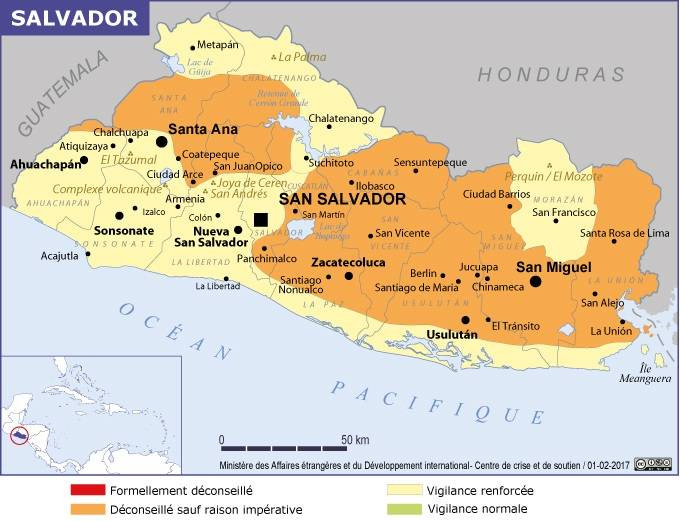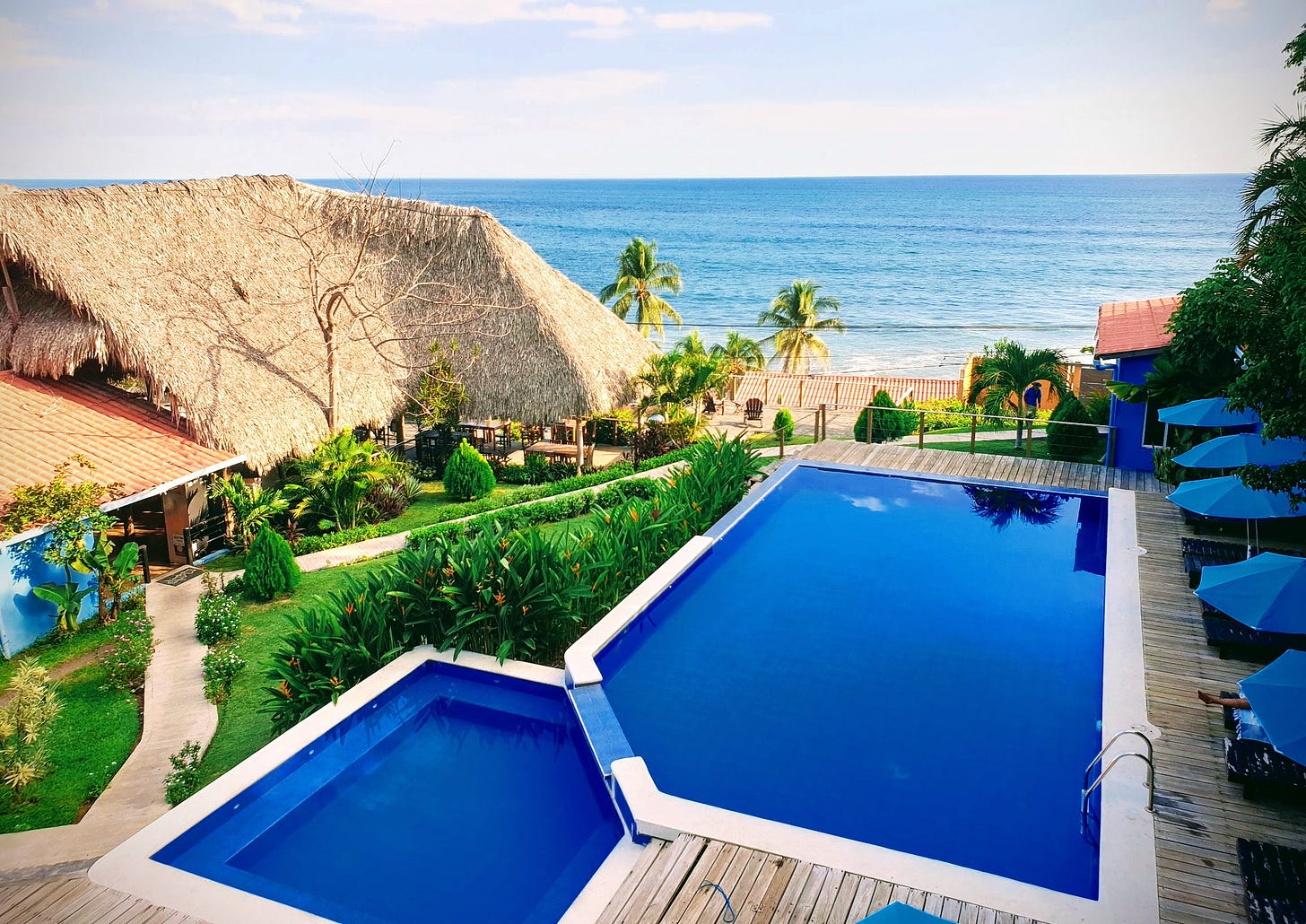El Salvador: My Travel Guide
Food, what to do, safety...
This is essay 4 of 6 for 1729 Writers Cohort #1. Apply to 1729 today.
El Salvador adopted Bitcoin as its official currency in September 2021. Since then, it has been described as “the trendiest country to travel to in 2022,” and tourism has increased by +30%. I visited El Salvador with my girlfriend in November (I wrote about my trip here), and we got a lot of questions about El Salvador, so here’s my short guide.
Getting there
There are many direct flights from the US, Canada, and Latin America. For Europeans, Iberia offers direct flights from Madrid. Actually, not direct, as there is a short “technical stop” in Guatemala (refueling?) when coming from Madrid. So you may not see this flight if you look for “direct” ones. Anyway, if you come from outside the American continent, you’ll probably need to make a stop in Mexico or the US. The local airport is modern, good, and efficient.
Safety and security
This question, unfortunately, always comes quickly. El Salvador has a terrible reputation, as many gangs operating in the US originate from the country. In 2015, El Salvador was the deadliest country outside a war zone. 😬 However, as I explained in another article, the number of homicides has since been divided by 6!
Still, the US, UK, and Canadian governments explain how unsafe the country is and why you should reconsider your trip. Surprisingly, the French government’s website is more detailed, less alarming, and closer to what we experienced. In the map below, about half of the country is in yellow (that I would translate as “Be careful and everything should be fine”), and the other half is in orange (“Travel not recommended”).
We were a bit nervous before visiting, but we eventually felt safe during our whole trip. Probably as safe if not safer as in Paris or San Francisco. Including when we were visiting alone without our guide. The Salvadoran government invested in a “tourist police” (POLITUR) that provides security in tourist areas and considerably improves safety. Locals also told us that gangs don’t target tourists because they extort businesses in the tourism industry, so gangs need to make sure tourists feel safe.
We didn’t rent a car as we read the roads were terrible, but the main roads were actually brand new and looked great. Minor roads were in bad shape, though, and everyone told us not to drive at night.
The situation can still evolve quickly: El Salvador is not (yet!) Singapore in terms of safety. It’s, for instance, common to see guards with machine guns in front of gas stations or restaurants. Please also note that 1/ we stayed in relatively safe “yellow” areas, and 2/ we were there for the Adopting Bitcoin conference; the government may have increased police protection during the event. So for your first trip, if you prefer to stay on the safe side, hire a guide to drive you around and organize hikes and visits. Our guide Salvatore from Tunco Life was fantastic; I strongly recommend him! (and of course, he accepts Bitcoin)

What to do in El Salvador?
We stayed ten days, in three different places:
Lago de Coatepeque and volcanoes
We had an Airbnb on Lago de Coatepeque, one of the most beautiful places I’ve ever visited. Waking up with the sunrise on the lake is unique. The lake and its changing colors mesmerized me. No wonder the Salvadoran elite owns summer houses there!
Around the lake, we visited the Maya ruins of El Tazumal and the cute colonial village of Concepción de Ataco.
We climbed the Santa Ana and Izalco volcanoes (both active). About 20 volcanoes dot El Salvador, and volcano climbing is super popular.

San Salvador
In the capital San Salvador, we mostly stayed at the conference hotel and didn’t visit the city. Not sure we missed much: El Salvador is known for its natural landscapes, not for its cities. 😅
Beaches and surf
El Tunco, El Sunzal, and El Zonte are three small beach towns in the department of La Libertad. They’re next to each other, but you cannot easily walk between them as the water covers the sand and rocks on the beach at high tide. We stayed at the great Kayu Hotel. The Salvadoran Bitcoin movement started in El Zonte, which is now known as “Bitcoin Beach.” The ocean is gorgeous, and the area is one of the best surf spots in the world: the 2021 ISA World Surfing Games were organized there. The Salvadoran government even renamed this coastline “Surf City!”
What’s the food like?
Huge disappointment when it comes to food: we expected delicious local dishes, but sadly El Salvador doesn’t produce many agricultural products locally and imports a lot from the US, often cheap, low-quality products. So food was often bland or even quite bad. A notable exception was the succulent El Jardín de Celeste in Ataco.
Still, you must try El Salvador’s national dish: pupusas, thick flatbread made with cornmeal and stuffed with cheese, meat, squash, and/or beans. Horchata is the most popular drink, and it goes well with pupusas:
What about Bitcoin adoption?
You can find Bitcoin ATMs all around the country. All big international chains (McDonald’s, Starbucks, etc.) accept Bitcoin. Many small businesses don’t accept Bitcoin, though, because they are against Bitcoin, don’t understand it, or simply don’t have customers using it. According to an independent survey done in December 2021 (3 months after the adoption of Bitcoin), 21% of the population uses Bitcoin at least once a month. And according to a March survey released by the Chamber of Commerce and Industry, 18% of businesses report having made sales in Bitcoin. The percentage is probably higher for individuals (like taxi drivers and guides) who can use their personal wallets. If the acceptance rate is about 20% nationally, this figure hides considerable geographical diversity. For instance, in November (just two months after the law’s adoption), the adoption was closer to 70-80% in the beach town of El Zonte and about 10-20% in Coatepeque.
In any case, El Salvador is the only place in the world where you can ask a business “Do you accept Bitcoin?” and the owner won’t laugh at you or ask “Bit-what?” There, it’s like asking “Do you take credit cards?” You may get a no, but it’s worth asking. Most importantly, you can see real Bitcoin use cases there, beyond trading and “hodling.” People use Bitcoin to avoid remittance fees, to pay online without a credit card (only 10% of Salvadorans own a credit card), and to pay their utility bills faster.
Where else can I find information?
El Salvador isn’t a trendy destination. Tourism is primarily local, and it can be hard to find detailed and up-to-date information in popular travel books. That’s why a local guide can be helpful. Wikivoyage and the Facebook group “Expats in El Salvador” are excellent sources of information.
We loved our trip, and even though the country is tiny, there are many things to do. We’d love to go back and visit other places such as Suchitoto, San Salvador, El Impossible, El Boqueron, waterfalls in Juayúa, Lake Ilopango, Joya de Ceren, Conchagua, and coffee plantations. All Salvadorans we met were extremely friendly, welcoming, and helpful. I hope tourism can boost the economy and change the country for the best. I also want to come back to see how Bitcoin adoption will evolve.
So if you like hiking, surfing, or Bitcoin/crypto, you should visit El Salvador. It’s also an excellent way to support the country and its inhabitants. Please let me know if you have any questions about El Salvador!
The El Salvador Series:








Great summary! I look forward to visiting sometime this year or next. Maybe at the next Bitcoin conference down there.